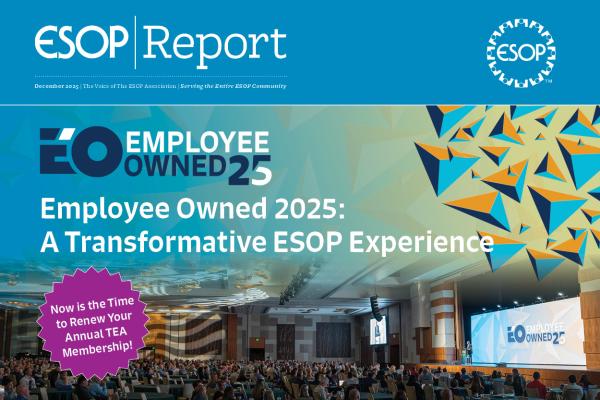In some ways, the benefits of having an ESOP are obvious: Tax benefits for S and C corps probably are at the top of the list, followed closely by increased employee engagement and productivity.
In other areas, research is constantly finding new and important ways that companies benefit from having an ESOP. Here are just some reasons that have been brought to light by recent research.
Attracting and Retaining Employees
Research sponsored by the Employee Ownership Foundation and released earlier this year shows that the vast majority of employees—from all walks of life and espousing political views that span the entire spectrum—want to work for employee owned companies.
All told, 72 percent of respondents to a nationally representative survey would rather work for a company owned by employees. That level of agreement just doesn’t exist in almost any other area of life.
What’s more, when choosing between two similar jobs, 61 percent would take the job at the employee owned company.
Think about the advantage this brings to ESOP companies: In a heated competition for talent, ESOPs hold a tremendous tie breaker that many other firms simply can’t offer.
In an era where corporate greed and excess is reported in the news on a continual basis, it is easy to see how companies that share the wealth through a consistent and reliable plan—like an ESOP—might be attractive to potential employees.
(Of course, to take advantage of this benefit, potential employees need to know what an ESOP is, and that you offer one. More on that in a later post.)
Attracting Customers
The same research study found that 38 percent of customers would prefer buying from employee owned companies. That means companies with ESOPs have a tremendous potential advantage when marketing their products and services.
Think how hard your business works to attract and retain customers, and how much money is invested in expanding your customer base. How many potential buyers might be persuaded to give your company a shot, if they only knew that you were employee owned? How much might those extra customers be worth to your business?
(Again, to reap these rewards, customers need to know that you are employee owned.)
Surviving Tough Economic Times
Companies with ESOPs were significantly more likely to survive tough economic periods, according to the data gathered and reported in the book How Did Employee Ownership Firms Weather the Last Two Recessions?
The book speculates that reasons for this phenomenon might include a more engaged workforce that strives to keep the business going when times are tough. That notion is supported by a 2013 study showing that ESOPs are linked to higher sales growth per worker and higher sales per worker. (Firm Survival, Performance, and Employee Ownership: Comparing Privately Held ESOP and non-ESOP Firms.)
Another potential reason—one also reported in the book—could be that employment at ESOP companies is more stable, experiencing fewer and smaller changes in annual employment than non-ESOP companies. For example:
- In 2001, non-ESOP companies shed nearly six percent of their workforce, while ESOP companies added a small percentage of employees.
- In 2004, ESOP companies grew staff by roughly four percent, while non-ESOP companies added nearly eight percent more staff. But those gains did not last all that long: In 2008-9, non-ESOP companies shed far more employees than ESOP companies.
These dramatic swings in staff size can have negative repercussions on the business as a whole. Those who remain employed at these companies may experience shock, survivor’s guilt, and burnout (if they are asked to take on too many of the duties of those who were let go).
Finally, the loss of institutional knowledge and expertise when staffs shrink can leave a business ill prepared to take advantage of the next upturn in the business cycle. By keeping staffing more stable, ESOPs may be better positioned to take advantage of the next rebound. And when they do, of course, all employee owners will share in the rewards.






